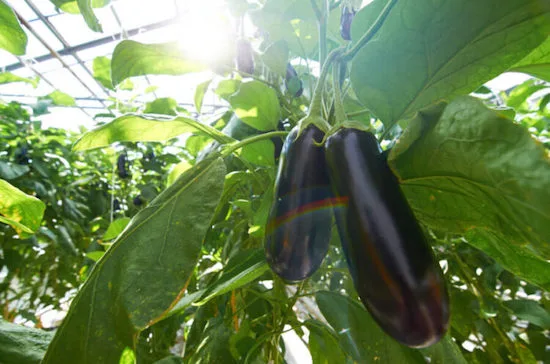Table of contents
Eggplant Growing in Australia
This Eggplant growing guide is to help you grow this plant also known as the aubergine. It is a great vegetable to absorb wonderful flavours while cooking. This plant is an excellent vegetable to grow in the dry season in the tropics.
Eggplant is also known as the aubergine or brinjal.
Most eggplants enjoy hot conditions. However, the following varieties of eggplant do well in very hot climates:
Aswad;
Rhapsody;
Ping Tung Long;
Thai Long Green;
Florida High Bush;
Pandor Striped Rose; and
Orient Express.

When to Plant Eggplant Australia
In Australia, the best time to plant eggplant is during the warmer months. Here’s a general guide based on regions:
- Tropical Regions: For best results you should plant from September to February. However we now grow eggplants all year round without difficulty.
- Subtropical Regions: Plant from September to January.
- Temperate Regions: Start seeds indoors around late winter (August) and transplant outside from late spring to early summer (November to January).
Eggplants love warm weather, so ensure that the last frost has passed before planting them outdoors. They thrive in well-drained, fertile soil with plenty of sunlight.
Eggplant Growing Season
Eggplants thrive in warm weather and are typically grown during the spring and summer months. They need a long growing season (about 100-120 days from planting to harvest), so it’s important to ensure they have plenty of warmth and sunlight for optimal yield.
Lebanese Eggplant Growing
Lebanese eggplant is a smaller, elongated variety of eggplant with smooth, dark purple skin and tender flesh. It is known for its mild flavor and slightly sweeter taste compared to larger globe eggplants. Lebanese eggplants are commonly used in Mediterranean and Middle Eastern cooking due to their versatility and quick cooking time.
Eggplant Growing from Seed
Growing eggplant from seed can be rewarding, but it requires warmth and patience. Here’s a step-by-step guide detailing stages in the process.
Eggplant Growing Stages
Time needed: 3 minutes
How to grow eggplant from seed.
- Sow Seeds
Soak seeds overnight and the next day sow them half a centimetre deep and 10 inches (25cm) apart (2-3 seeds in each hole).
- Sun and Water
Plant in a location that has full sun. They will need at least 1 inch (2.5cm) of water per week. It is better to give one thorough soaking twice or three times a week.
- Thin Seedlings
Thin out your seedlings, so your plants are about 20 inches (50cm) apart.
- Fertilise
Apply a balanced fertiliser. Over fertilising will result in an overgrown healthy looking vine that fails to produce fruit.
- Harvest
Some varieties start fruiting in as soon as two months. Others may take over three months before fruiting.
Eggplant Growing in Pots
Adopt the same process as above when growing in pots. When planting, add a balanced, slow-release fertiliser and then repeat every few weeks during the season, especially when plants start to bloom.
Because it has fairly deep roots, eggplant can be grown in a wide range of soils. So sandy loams or alluvial soils are fine. Indeed the main thing is that the soil is deep and free draining. It is good to have a high content of organic matter in the soil, so don’t be afraid to work in heaps of compost before planting.

Eggplant Growing Conditions
Plant in full sun in well draining soil.
Eggplant Growing Temperature
In terms of optimal temperature, eggplants grow best between 70°F to 85°F (21°C to 29°C). Night temperatures should not drop below 55°F (13°C).
Fertilising
Use a fertiliser rich in nitrogen, phosphate and the potassium. Be sure to apply the fertiliser to the base of the plant so you do not burn the leaves.
Eggplant Growing Tips on Watering
Eggplant needs 1.5 inches (4cm) of water each week. This is best provided in 1 or 2 watering sessions, so a deep watering occurs. Hence, this gets the water to the roots of the plant.
Eggplant Growing Problems
Insect pests and diseases are more of a problem during the wet season. This is due to the hot humid conditions.
The major pests in the tropics are leaf eating beetles, aphids and caterpillars. However, you can pick these off your vine at home, or if the challenge is bigger you can use an insecticide.
Regular application of ‘white oil’ can help address these pests. Indeed white oil is an effective organic pesticide that you can make at home.
Following these eggplant growing tips should help you grow a healthy crop!
Eating Eggplant
Eating eggplant can be a delightful and nutritious experience. Indeed, eggplant is a versatile vegetable used in various cuisines around the world.
Health Benefits
Eggplant is low in calories and high in nutrients, making it a healthy addition to any diet. Here are some of its nutritional benefits.
Weight Loss
Eating eggplants can help keep your blood sugar stable. Indeed the fibre in eggplant can lower blood sugar by slowing the rate of digestion and absorption of sugar in the body.
Consequently, this slower absorption keeps blood sugar levels steady and prevents spikes and crashes. As a result, eggplant consumption is consistent with dietary recommendations for controlling diabetes.
Fibre
Eggplant contains fibre that is low in calories. So a 1-cup serving of cooked eggplant provides 2g of dietary fibre.
Fibre may also help lower your LDL, or “bad” cholesterol and reduce your blood pressure and decrease your chance of cardiovascular disease.
Immune System
The high levels of Vitamin C make this vegetable a valuable food in boosting your immunity.
Antioxidants
In addition this plant contains antioxidants like the beta carotene in eggplant help to combat free radicals in your body.
Prebiotics
Furthermore, eggplant is a great source of prebiotic fibre that will have a positive effect on your gut health.
All of the eggplant growing tips above are worth the effort when it results in tasty produce that is good for your health.
Other Tropical Vegetables
- Capsicum
- Cucumber
- Jicama
- Kangkong
- Malabar Spinach
- Pak Choi
- Perpetual Spinach
- Pumpkin Growing
- Snake Beans Growing
- Sweet Potato
- Tatsoi



Comments
3 responses to “Eggplant Growing Guide”
[…] Eggplant […]
[…] Eggplant […]
[…] Eggplant […]